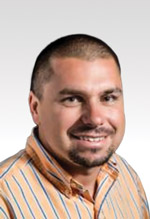
Basil Manley Conway IV Columbus State University, Columbus, GA
Basil Conway IV is an associate professor of mathematics education in the College of Education and Health Professions at Columbus State University and serves as the mathematics education graduate programs director. He serves on numerous doctoral committees as both a chair and methodologist. He earned his BS, MS, and PhD. in mathematics education from Auburn University in 2005, 2012, and 2015, respectively. He also completed his MS in statistical science at Colorado State University in 2010.
Basil previously spent 10 years teaching in public middle and high schools before he became a teacher educator. During this time, he also worked as an instructor at a local junior college. Over the past 17 years of service in teaching mathematics and future teachers of mathematics, he has served in various local mathematics education leadership positions and organizations including Transforming East Alabama Mathematics (TEAM-Math), Auburn University’s Teacher Leader Academy, East Alabama Council for Teachers of Mathematics, Woodrow Wilson Fellow, National Mathematics and Science Initiative, and A+ College Ready. He has published works related to teaching mathematics for social justice in numerous books and journals and has a special interest in statistics education.
Basil’s lens for teaching and student learning draws heavily from Vygotsky’s theory of social constructivism in which language and culture play essential roles in human intellectual development. Thus, he believes the co-construction of knowledge is paramount in the development of students’ social, religious, and mathematical identities. He believes teachers, parents, other students, cultural norms, and other cultural communicative devices play a critical role in shaping students’ knowledge of themselves, faith, and mathematics.




